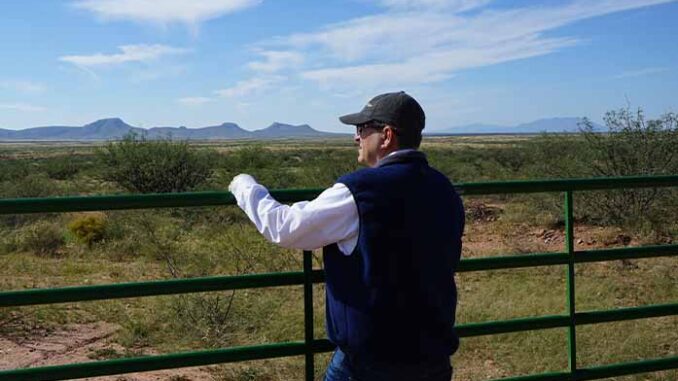
Earlier this month Arizona’s attorney general issued an opinion that the ongoing influx of thousands of undocumented non-U.S. citizens (UNCs) coming into the state through Mexico constitutes an invasion.
Since then, nothing has changed with the border situation. But many of the calls for Gov. Doug Ducey to declare a state of emergency based on an invasion argument and immediately deploy the Arizona Army National Guard troops to the border have quelled.
Maj. Gen. Michael “Mick” McGuire, USAF (Ret.) knows a few things about the southwest border and the National Guard. From 2013-2021, McGuire served as director of Arizona’s Department of Emergency and Military Affairs (DEMA), responsible for responding to emergencies such as floods, wildfires, acts of violent civil unrest, and COVID-19.
During the same time, McGuire was Adjutant General of the 8,300-member Arizona Army National Guard where he oversaw the largest mobilization since 1942 when more than 85 percent of the state’s guardsmen were on-duty at one time during the height of the pandemic.
McGuire, who is now a Republican candidate for U.S. Senate, told Arizona Daily Independent he does not question the attorney general’s invasion opinion. He is, however, eager for Congress to finally recognize the border crisis and provide the funds needed so Arizona taxpayers don’t have to foot the bill.
“Democrats are okay with the spending of $5 billion for the SoFi Stadium in California yet not in support of $3 billion for securing the border,” McGuire said. “We have to get the money for completion of the wall and for all of the surveillance, as well as the money to bring back the Army’s moth-balled OH-58D [reconnaissance] helicopters and whatever else agencies say they need at the border.”
Before his April 2021 retirement, McGuire took part in many meetings about concerns that terrorist groups like ISIS could easily enter the U.S. undetected through the porous, unsecured southwest border. He also heard repeated concerns from residents in border communities about fears for their families.
“Border security must be our top priority,” McGuire said. “No border, no security. No security, no country. It really is that simple.”
There is also the human cost to President Joe Biden’s disregard for border security.
“We had 90,000 Americans die in 2020 due to illegal drugs like fentanyl coming unchecked across the southwest border,” McGuire said. “That is the equivalent of 120 infantry battalions, each with 750 members. America has never lost that many in warfare.”
It is time, he said, to understand that America “is not only at risk from traditional military threats. We’ve got to think beyond the traditional. And border security is human security – on both sides of the border.”
If the Biden Administration and Congress continue to ignore the border, McGuire agrees Ducey has myriad options to address the crisis. He is not against declaring a state of emergency under the invasion option, but believes it is important to understand the “hefty cost” to taxpayers if the White House refuses to reimburse the state.
One way for Arizona’s Army National Guard to be mobilized is by Presidential order, which typically involves an out-of-country deployment. In such a situation, the federal government foots all the bills.
Ducey also has power to utilize the Guard as outlined in Title 32 of the U.S. Code, according to McGuire. It allows the governor to order a member to perform Active Guard and Reserve duty, although it requires the consent of the Secretary of the Army. Upon requisition of the governor, the Army Secretary would then provide “the supplies necessary to uniform, arm, and equip” the Guard for the duty.
A third option is for Ducey to issue orders activating the Guard without approval of the Secretary of the Army. This places the entire cost of the operation squarely in the wallet of Arizona taxpayers at what McGuire estimates would be $500 per day, per member for expenses including payroll, housing, meals, equipment, vehicles, and training.
If Ducey calls up just one-fourth of the Guard it would cost more than $1 million a day based on McGuire’s estimates. The governor’s proposed Arizona National Guard / border budget for the next fiscal year is currently only $50 million.
McGuire believes something needs to be done about the border sooner than later to protect the safety of Americans and the vibrancy of Arizona’s economy. If it means a large Guard presence at the border or in border communities, “they will definitely be ready and able,” McGuire said.
That said, he is frustrated that the invasion option could allow the federal government to shirk its obligations by passing off the cost of a secure border to Arizonans who have already paid for border protection in their federal taxes.
He does not want to see Biden or Senator Mark Kelly “get off the hook” like that after all the hard work and efforts to get Arizona’s economy through the pandemic.
